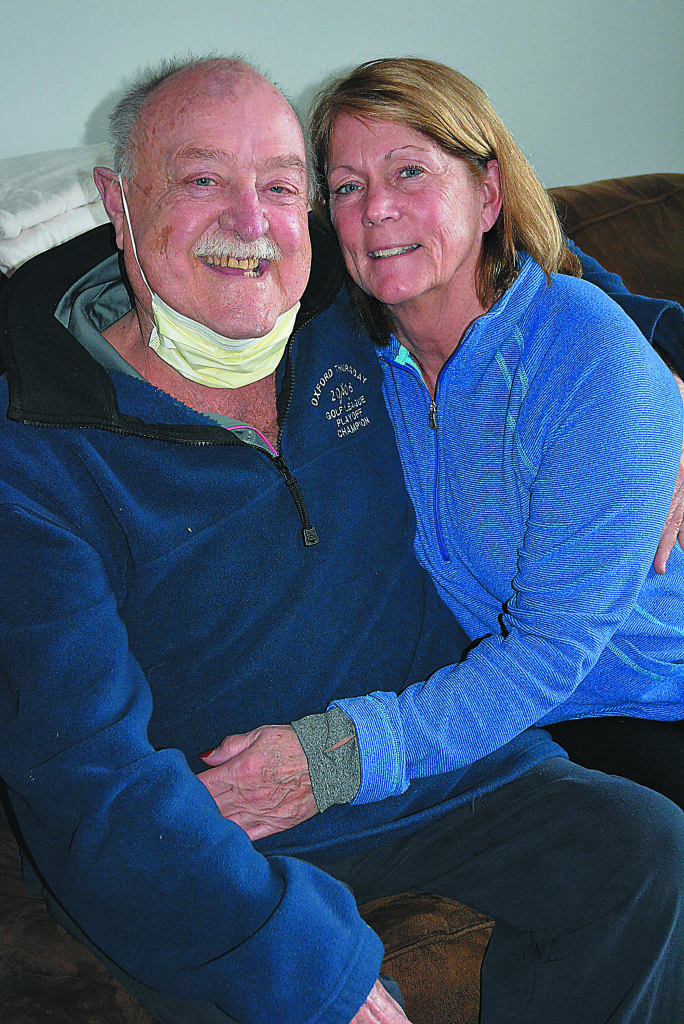
When it comes to gifts, some folks get stumped about what to give their spouse.
But not Oxford resident Kathy Hubbard. She knew exactly what to give Bob, her husband of 36 years – one of her kidneys.
“I never even thought twice,” said Kathy, 64. “I would do it again in a heartbeat.”
The transplant took place on Nov. 2 at Henry Ford Hospital in downtown Detroit.
Without his wife’s generous gift, Bob, 68, owner of Oxford Hills Golf and Country Club, would still be undergoing the daily home dialysis treatments he began in June. Each treatment lasts nine hours.
Over time, Bob’s kidneys had gradually lost function until they finally failed, meaning toxins (waste) and extra fluids were building up in his body with no way to naturally release them.
He needed a transplant, but the chances of him getting a new kidney from a deceased donor didn’t appear to be very good.
According to the Living Kidney Donor Network (LKDN), there are more than 80,000 people on the kidney transplant waiting list and many wait more than five years for a kidney from a deceased donor. Only 1 percent of the untimely deaths of donors result in organs that can be used.
The waiting list has doubled in size over the last 10 years and continues to grow, according to the LKDN. Every year, 4,500 people die waiting for a kidney transplant, the LKDN reports.
“With the waiting list, I don’t know if he would have ever got a kidney,” Kathy said. “We weren’t even sure if he was going to be eligible because of all of his medical issues.”
Bob is diabetic. He also had open-heart surgery (a valve replacement and bypass) five years ago.
Ultimately, Bob was approved for the transplant waiting list, but Kathy stepped up to the plate and offered him one of her kidneys instead.
“He’s my husband,” she explained. “I want him to be around. I want to share the rest of my life with him. We’re going to retire, eventually. Who am I going to play golf with?”
“Every wife would do that for their husband,” Kathy added. “People say to me, ‘I can’t believe you did that,’ and I say, ‘Why wouldn’t you do it?’ He would do it for me.”
It is common for blood relatives (parents, children, siblings, etc.) to be living kidney donors. However, donors can also be spouses, in-law relatives, friends, co-workers, neighbors and community members.
“A genetic link between donor and recipient, although beneficial, is not necessarily required,” stated the LKDN website www.lkdn.org. “This is largely due to improved anti-rejection medications. These type of ‘non-related’ transplants are becoming more common.”
Kathy was tested and learned she was a compatible donor.
Living donors must be over the age of 18 and usually under the age of 70. They must also be in good general health.
“You have to be the healthiest person in the world just to qualify,” Bob said. “I’m glad she took care of herself.”
Once she was cleared by an extensive medical, surgical and psychological assessment to determine her fitness to be a donor, Kathy was ready to give Bob the gift of a better life.
Following the transplant, Bob said he immediately “felt a lot better.” He has much more energy and his mind is clear.
“I used to be tired all the time,” he said. “Now, I’m up at 7 o’clock in the morning driving her nuts.”
“He is a lot sharper,” Kathy said.
The procedure was initially much harder on Kathy. It left her feeling tired, sore and uncomfortable for a while. As an active person who enjoys running and swimming, she’s not used to that.
“I’m never sick. I always going, going, going,” she said.
Fortunately, the Hubbards had their four daughters – Ann, Kate, Beth and Clare – to care for them following the procedure. They came from all over – western Michigan, Washington D.C., Wisconsin and Texas – to help their parents. Ann’s husband, Tim Offer, and Kate’s husband, Jeremy Ison, also came to lend a hand.
“I don’t know what we would have done without them,” Kathy said.
“We couldn’t have done it without them,” Bob said. “Both of us were just wiped out.”
Local friends showed their support by helping the daughters and providing meals for the Hubbards.
“It was nice to have everybody pitch in,” Kathy said. “It really helped the girls.”
The Hubbards are doing well now. Kathy’s back to her normal self and Bob’s new kidney is functioning just as it should be.
“So far, so good,” Kathy said.
Bob has an extensive list of short-term and long-term restrictions related to diet, travel, activities and contact with other people, but that’s a small price to pay for his new lease on life. He’s extremely grateful to his wife for her selflessness and “wonderful” deed.
As for Kathy, she has no regrets.
“I think it was the best decision,” she said. “I never questioned it at all.”
To anyone out there considering donating a kidney to someone in need, Kathy said, “I say go for it. I would do it again.”

I am happy Kathy, who is my sister, was able to do this for her husband, my husband was not as fortunate as I would not have been a match. Bless them both and their family with many happy years to come.